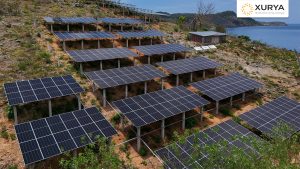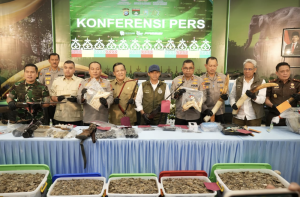Jakarta – The Indonesian government’s plan to revise the new and renewable energy (NRE) target from 23% to a range of 17% to 19% by 2025 has raised the Civil Society Coalition for Energy concerns. Through the voices of experts and activists, they voiced concerns about the potential negative impact of the plan on investor confidence in the country’s renewable energy sector.
In a written statement, the Energy Transformation Program Manager of the Institute of Essential Services Reform (IESR), Deon Arinaldo, argued that the lowering of the target was not caused by problems with the economics of renewable energy but by obstacles in the development and procurement process. He said that there is a need for quick improvements in this process, especially in response to the slow realisation of PT PLN’s (Persero) plan to build renewable energy plants according to the 2021-2030 RUPTL of 20.9 gigawatts (GW) to date.
“Indications of a reduction in the target can harm investor confidence in renewable energy investment in Indonesia, even though it is still in the draft RPP of the National Energy Policy (KEN),” he said.
The Study Division of the Indonesian Parliamentary Center (IPC), Arif Adiputro, added another dimension to the target revision. According to him, the revision contradicts Indonesia’s commitment to reaching carbon neutrality by 2060 and reducing greenhouse gas emissions by 29-31%.
Adiputro argues that increasing the renewable energy mix target to 45% by 2030 is necessary for Indonesia to remain consistent with its global commitments. The coalition also highlighted regulatory aspects, especially the implementation of Minister of Energy and Mineral Resources Regulation 26/2021, which regulates rooftop solar power plant (PTLS) regulations. They emphasised that delays in implementation could hamper the national strategic project of 3.6 GW rooftop PTLS by 2025, which has been set by the government.
Grita Anindarini, Deputy Director of the Indonesian Center for Environmental Law, highlighted the revised National Energy Policy (KEN) draft, which includes several false solutions in the energy transition strategy. The utilisation of palm-based biodiesel, carbon capture technology (CCS/CCUS) in fossil-based power plants and the operation of 250 megawatts (MW) nuclear power plants (PLTN) are considered to pose major risks to human rights and the environment.
With a focus on electricity, Koaksi Indonesia’s Program Director, Verena Puspawardani, highlighted the potential positive impact of sustaining renewable energy targets. With a consistent target of 23% by 2025 and an increase to 31% by 2050, Verena estimates that employment in renewable energy engineering could reach 432,000 by 2030.
“This will certainly contribute to the achievement of investment targets for green industry development, address future employment needs, and gain public support for renewable energy,” Verena said.
Overall, these public voices highlight the importance of ensuring that the revised renewable energy target considers not only the economics but also sustainability, investment, and commitment to the global agreement on climate change. (Hartatik)















